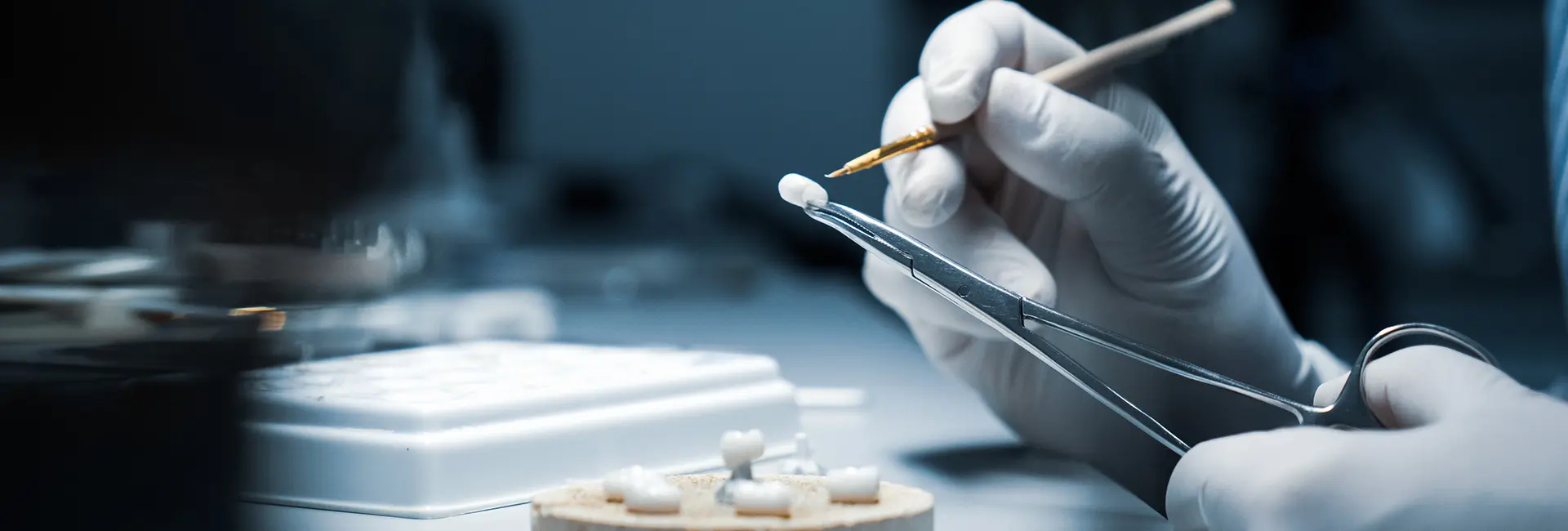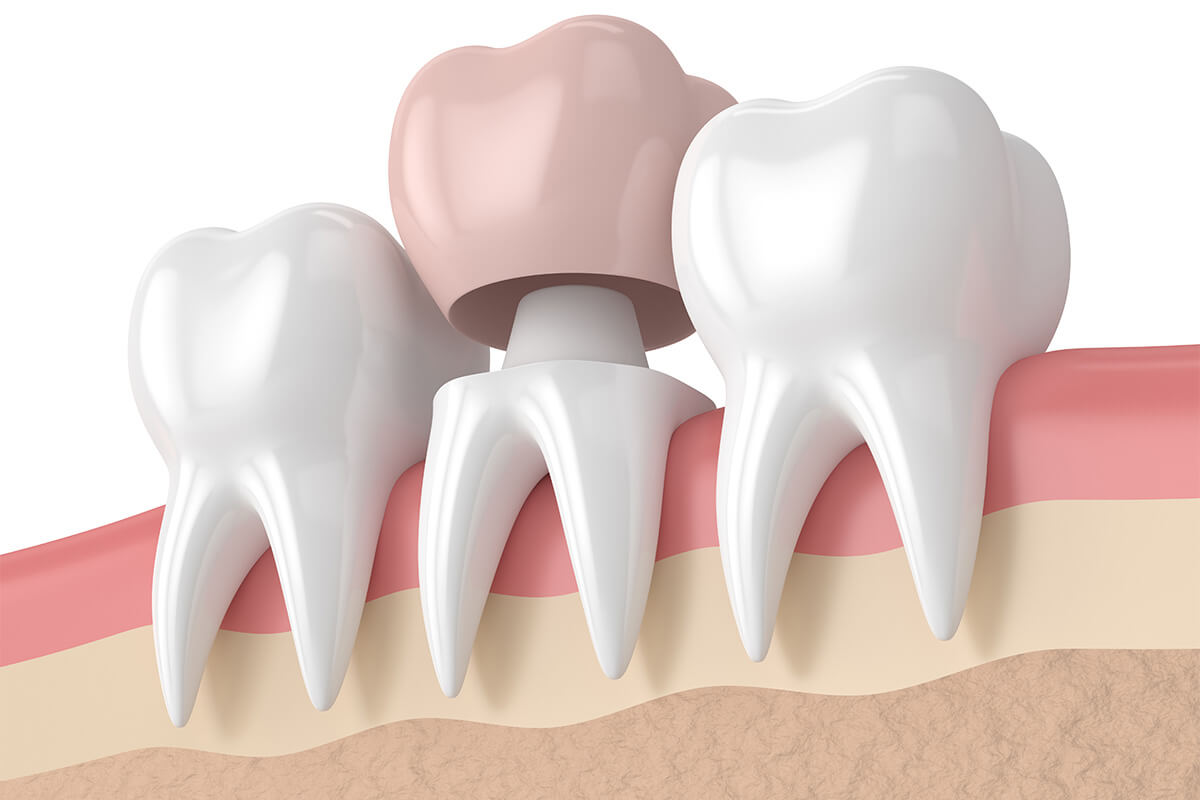Dental crowns are used to restore teeth that have been damaged by decay or trauma. Inlays and onlays are an alternative to dental crowns and are used to repair moderately damaged teeth. Here, we’ll discuss dental crowns and inlays and onlays to help you understand these restorative options.
Key Takeaways
- Dental crowns are used to restore damaged teeth and protect them from further decay or damage. Inlays and onlays are conservative alternatives to full dental crowns and are used to repair moderately damaged teeth.
- Both dental crowns and inlays/onlays require two appointments for placement.
- With proper care, these restorative options can last for many years and provide long-term support for damaged teeth.
- Regular dental check-ups and good oral hygiene habits can help prevent the need for extensive restorative treatments. So keep up with your preventive care!
Dental Crowns
Dental crowns are custom-made caps that cover the entire tooth. They are used to restore the natural tooth structure when it has been weakened by dental decay, extensive tooth damage, or after a root canal treatment. Crowns protect the weakened teeth and restore their function and appearance.
Dental crowns are ideal for:
- Restoring a badly decayed tooth
- Covering a tooth that has undergone root canal treatment
- Replacing a worn-down or broken tooth
- Covering dental implants
- Improving the appearance of a discolored or malformed tooth
Types of Dental Crowns
We offer two types of high-quality dental crowns:
Zirconia Crowns:
- Made from durable zirconia
- Natural tooth-colored appearance
- Long-lasting and fracture-resistant
Emax Crowns:
- Made from lithium disilicate ceramic
- Exceptional strength and aesthetic quality
- Highly resistant to chipping
Dental Crown Procedure
This dental procedure typically requires two appointments.
First appointment:
- We will prepare the tooth by removing any decay and shaping it to fit the crown.
- An impression/scan of the prepared tooth is taken and sent to a dental lab where your custom crown will be made.
- A temporary crown is placed over the prepared tooth while you wait for your permanent one.
Second appointment:
- We will remove the temporary crown and check the fit of your permanent one before cementing it into place.
- With proper care, dental crowns can last for many years and provide long-term support for damaged teeth.
If a dental crown is needed after a root canal, the procedure looks a bit different. The tooth will already be hollowed out, and we will fill it with a special material before placing the crown on top. For a full description of the root canal procedure, see our Root Canal service page.
Inlays and Onlays
Inlays and onlays are conservative alternatives to full crowns and are used to repair moderately damaged teeth. Unlike dental fillings that are applied directly into the cavity, inlays and onlays are custom-made indirect fillings that are bonded to the tooth. Think of them as a hybrid between dental fillings and crowns.
Inlays and onlays are perfect for:
- Repairing larger cavities that are too extensive for composite fillings but not large enough for a dental crown
- Restoring damaged tooth surfaces, including the tooth cusp (pointy portion of the tooth’s biting surface)
- Providing a solid piece to strengthen the tooth structure
Types of Inlays and Onlays
Inlays:
- Bonded within the tooth’s surface
- Used for smaller areas of decay or damage
Onlays:
- Extends over one or more of the tooth’s cusps
- Suitable for repairing larger areas of tooth damage
Inlay and Onlay Procedure
The procedure is similar to that of dental crowns and also requires two appointments.
First appointment:
- We will prepare the tooth by removing the decay or the old dental filling.
- An impression of the prepared tooth is taken and sent to a dental lab where your custom restoration will be made.
- A temporary filling is placed over the prepared tooth while you wait for your permanent one.
Second appointment:
- We will remove the temporary filling and check the fit of your permanent restoration before bonding it into place.
Dental crowns and inlays and onlays are durable, long-lasting restorations that provide strength and stability to damaged teeth. With proper care,they can help you maintain a healthy, beautiful smile for years to come.
Argyle Dental & Prosthodontics: Your Trusted Dentist in Centennial, CO
Dr. Ava Khodakhast, our board-certified prosthodontist, and her team are dedicated to providing exceptional dental care and personalized treatment plans that meet your needs.
Schedule an appointment with us to learn more about how we can improve your oral health and restore the natural function and appearance of your teeth.
Remember, prevention is always better than restoration. Keep up with regular dental check-ups and maintain good oral hygiene practices at home to avoid the need for extensive restorative treatments.
If you are searching for dental crowns in Centennial, dental crowns in Highlands Ranch, CO, or a ‘dentist near me’, we can help! Our office in Centennial, CO is conveniently located in Arapahoe County, just 5 miles from Douglas County.
Call (303) 770-2254 to book an appointment or complete the online inquiry form. We look forward to helping you achieve a healthy, confident smile!
FAQs
The cost of an onlay or a crown can vary depending on the type of material used and the complexity of the procedure. In general, dental crowns tend to be a little more expensive as they cover the entire tooth while inlays/onlays only cover a portion of the tooth. We will provide you will an estimate during your consultation.
With proper care and regular check-ups, dental crowns can last for many years. However, they may need to be replaced if they become damaged or worn over time.
No, the placement of a dental crown should not be painful. We use local anesthesia to numb the area before starting the procedure to ensure your comfort. You may experience some discomfort after the procedure as your mouth adjusts to the new restoration, but this should subside within a few days.
We will create a custom crown that matches the color and shape of your natural teeth, making it nearly indistinguishable from your other teeth. This ensures a natural, seamless appearance.
Yes, you can eat normally with a dental crown. However, we recommend avoiding hard foods that may damage the crown. Maintain good oral hygiene practices to ensure the longevity of your restoration.




